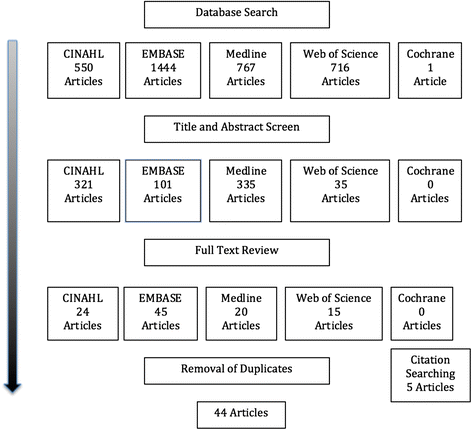Scoping review of complexity theory in health services research
- PMID: 26968157
- PMCID: PMC4788824
- DOI: 10.1186/s12913-016-1343-4
Scoping review of complexity theory in health services research
Abstract
Background: There are calls for better application of theory in health services research. Research exploring knowledge translation and interprofessional collaboration are two examples, and in both areas, complexity theory has been identified as potentially useful. However, how best to conceptualize and operationalize complexity theory in health services research is uncertain. The purpose of this scoping review was to explore how complexity theory has been incorporated in health services research focused on allied health, medicine, and nursing in order to offer guidance for future application. Given the extensiveness of how complexity theory could be conceptualized and ultimately operationalized within health services research, a scoping review of complexity theory in health services research is warranted.
Methods: A scoping review of published research in English was conducted using CINAHL, EMBASE, Medline, Cochrane, and Web of Science databases. We searched terms synonymous with complexity theory.
Results: We included 44 studies in this review: 27 were qualitative, 14 were quantitative, and 3 were mixed methods. Case study was the most common method. Long-term care was the most studied setting. The majority of research was exploratory and focused on relationships between health care workers. Authors most commonly used complexity theory as a conceptual framework for their study. Authors described complexity theory in their research in a variety of ways. The most common attributes of complexity theory used in health services research included relationships, self-organization, and diversity. A common theme across descriptions of complexity theory is that authors incorporate aspects of the theory related to how diverse relationships and communication between individuals in a system can influence change.
Conclusion: Complexity theory is incorporated in many ways across a variety of research designs to explore a multitude of phenomena.. Although complexity theory shows promise in health services research, particularly related to relationships and interactions, conceptual confusion and inconsistent application hinders the operationalization of this potentially important perspective. Generalizability from studies that incorporate complexity theory is, therefore, difficult. Heterogeneous conceptualization and operationalization of complexity theory in health services research suggests there is no universally agreed upon approach of how to use this theory in health services research. Future research should include clear definitions and descriptions of complexity and how it was used in studies. Clear reporting will aid in determining how best to use complexity theory in health services research.
Keywords: Complexity theory; Health services research; Theory.
References
Publication types
MeSH terms
LinkOut - more resources
Full Text Sources
Other Literature Sources


